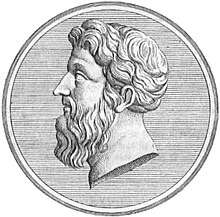Chilon of Sparta
Chilon of Sparta (fl. 6th century BC) was a Spartan and one of the Seven Sages of Greece.

Life
Chilon was the son of Damagetus, and lived towards the beginning of the 6th century BC. Herodotus[1] speaks of him as contemporary with Hippocrates, the father of Peisistratus. Diogenes Laërtius states that he was an old man in the 52nd Olympiad (572 BC), and that he was elected an ephor (overseer) in Sparta in the 56th Olympiad (556/5 BC). Alcidamas states that he was a member of the Spartan assembly.[2] Diogenes Laërtius even goes so far as to claim that Chilon was also the first person who introduced the custom of joining the ephors to the kings as their counselors.[3]
Chilon is said to have helped to overthrow the tyranny at Sicyon, which became a Spartan ally. He is also credited with the change in Spartan policy leading to the development of the Peloponnesian League in the sixth century BC.[4] Another legend claims that he died of joy when his son gained the prize for boxing at the Olympic games,[5] and that his funeral was attended by all the Greeks assembled at the festival.[3]
One of his descendants married king Anaxandridas II of Sparta and bore his son, king Cleomenes I.
Sayings and teachings
Chilon of Sparta said also the famous Ancient Greek proverb: "Το λακωνίζειν εστί φιλοσοφείν " in English " less is more" or " brevity is the soul of wit" or " brevity is a way of philosophy" which means that the best way of being a philosopher is through brevity and describes the Spartans' way of thinking and attitude. Diogenes Laërtius describes him as a writer of elegiac poems, and attributes many sayings to him:[3]
- "Do not speak evil of the dead."
- "Honor old age."
- "Prefer punishment to disgraceful gain; for the one is painful but once, but the other for one's whole life."
- "Do not laugh at a person in misfortune."
- "If one is strong be also merciful, so that one's neighbors may respect one rather than fear one."
- "Learn how to regulate one's own house well."
- "Do not let one's tongue outrun one's sense."
- "Restrain anger."
- "Do not dislike divination."
- "Do not desire what is impossible."
- "Do not make too much haste on one's road."
- "Obey the laws."
According to an inscription at the Bath of the Seven Sages in Ostia "cunning Chilon taught to fart silently."[6]
References
- Herodotus, i. 59
- Alcidamas ap. Aristotle, Rhet. ii. 23. 11
- Diogenes Laërtius, i. 68-73
- Hammond, N.G.L. & Scullard, H.H. (Eds.) (1970). The Oxford Classical Dictionary (p.229). Oxford: Oxford University Press. ISBN 0-19-869117-3.
- Chisholm, Hugh, ed. (1911). . Encyclopædia Britannica. 6 (11th ed.). Cambridge University Press. p. 163.
- Ann Olga Koloski-Ostrow, The Archaeology of Sanitation in Roman Italy: Toilets, Sewers, and Water Systems, The University of North Carolina Press , 2015, p.115: in the original Latin 'Vissire tacite Chilon docuit subdolus.'
Further reading
- Franz Kiechle: Chilon. In: Der Kleine Pauly, Bd. 1 (1964), Sp. 1146.
- G.L. Huxley. Early Sparta, 1962
- The Lives and Opinions of the Eminent Philosophers, by Diogenes Laërtius
- Pliny, 7, c. 33.
External links
| Wikimedia Commons has media related to Chilon of Sparta. |
